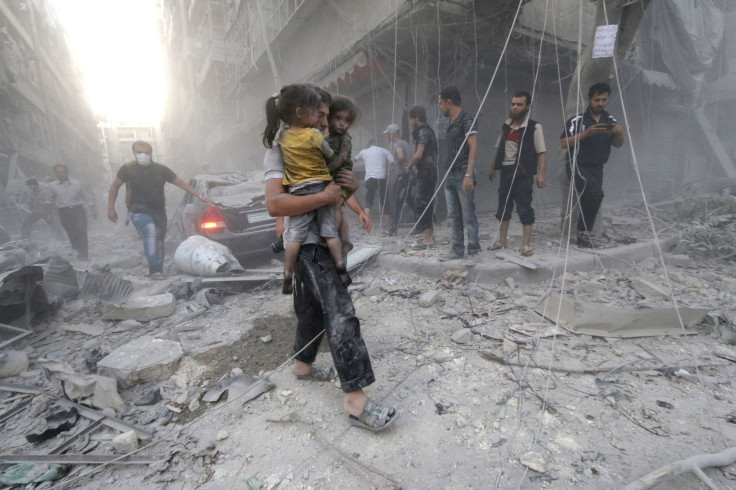Russia Bombs Islamist Rebel Group Al Nusra, Starts Battle For Aleppo

Russia bombed several buildings and vehicles at the headquarters of Jabhat al-Nusra, an extremist rebel group with links to al Qaeda, in the countryside of Aleppo, Syria, Wednesday night, rebel soliders said on their social media accounts. The bombing marked the beginning of President Bashar Assad's regime forces' offensive to take back the city from the rebels, who have held the city since the summer of 2012.
The bombings in the Aleppo countryside came at the same time as rebel soldiers reported explosions at the Russian naval facility in Tartus, a city on the Mediterranean coast of Syria. It was not clear at the time of this report what caused the explosions.
The Syrian Observatory for Human Rights, a British monitoring group in Syria, confirmed the shelling in villages around Aleppo.
Hezbollah, the Iranian militant group active in Syria in supporting Assad, sent soldiers to the Aleppo countryside at the beginning of the week in anticipation of the attack on the country's second largest city. Russia, Iranian troops and Syrian pilots are taking part in the offensive in Aleppo.
On the rebel side, there are dozens of groups that have a presence in the city and will be fighting back against the regime. Jabhat al Nusra is the strongest rebel group, equipped with the most ammunition and heaviest weaponry. Other rebels include some of those that have in the past been trained and equipped by the U.S. under a Central Intelligence Agency program that began in 2013 but ended last year. The Islamic State group, also known as ISIS, also has a presence in Aleppo, and has recently made significant gains, taking control of seven villages in the countryside in the last week alone.
Members of the rebel group trained by the U.S. told International Business Times in recent interviews that ISIS is benefitting from the Russian airstrikes because soldiers can take over land without losing any men.
There is a chance that the Sunni militant group will gain even more ground in the new offensive.
If ISIS takes over Aleppo, the terrorist group will seize control of a strategically important highway that leads north to the border of Turkey, a key supply route, and east to Raqqa, the militant group's de facto headquarters. Syrian rebels have not worried about the fall of Aleppo for close to six months, Abu Zayd said, but since the Russian airstrikes started, rebels have seen ISIS advance quicker that at any time in the past two years.
This is the third time the rebels in Aleppo have prepared for a massive assault.
Nearly two years ago, men living in the suburbs of Aleppo were preparing to head to Salaheddin, the main district in the city, to fight Assad’s forces. More than a year had passed since the revolution began and the military was still in control of perhaps the most important stronghold in the entire country. But on July 19, 2012, opposition soldiers made a bold move to seize the city, giving them access to the hub of the country’s economic activity.
In July 2014, the rebels in Aleppo had to defend the city from the regime. For slightly more than 10 days, the Syrian military conducted airstrikes on the town of Azaz, 20 miles northwest of Aleppo, in an attempt to eliminate opposition offensives around the city.
This battle, though, will be different. It will mark the first time the Assad regime has entered into a battle for a major city with significant air power and an unlimited supply of weapons.
© Copyright IBTimes 2025. All rights reserved.





















